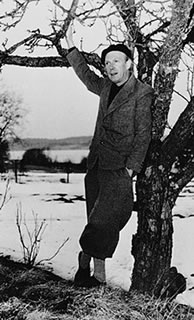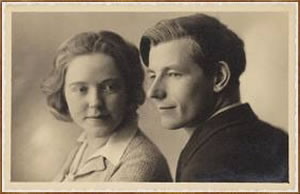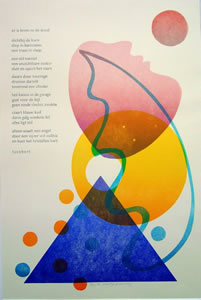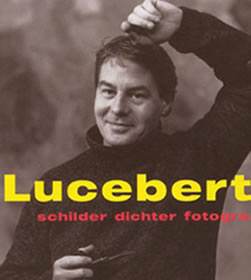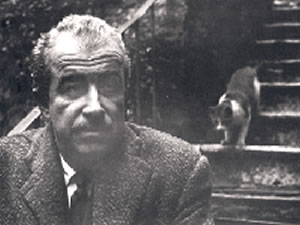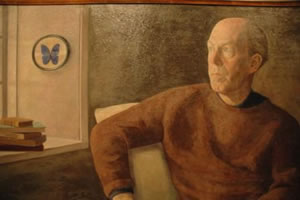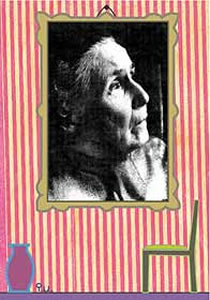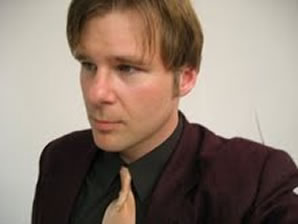De Zweedse dichter en schrijver Bengt Gunnar Ekelöf werd geboren op 15 september 1907 in Stockholm. Zie ook alle tags voor Gunnar Ekelöf op dit blog.
Oecus
It happens sometimes when I lie sleepless
on the bed with bronze paws, under the silent lamp:
I hear the slaves rustling and whispering nearby —
didn’t the heavy, shadowlike curtain stir just now?
Are they deciding if they dare enter this room
if they dare approach me? I am a stranger here
while they belong to the household. But perhaps they don’t dare
because I am one of the living, because the Oecus
the master’s chamber, is forbidden to them and holy?
Maybe it’s the major-domo whispering out there:
The raised whisper—someone in the crowd is contentious
is calmed down, reassured. —Dragging steps and silence
I wrap myself in the blankets which disintegrated long ago
and wait. Is that the curtain stirring again?
Or did the lamp flicker? What draft can exist
in this house, close as it is? I am here simply as a person
in need of shelter. Did someone lift the curtain? Or want something of me?
Sometimes when I wake from my sleep or torpor
I feel as if someone had just touched me
as if someone had awkwardly tried to stroke my hand.
Heard in a dream in the year 63, on the x sth of the harvest month at night:
“You lie asleep in a sarcophagus with no bottom”—
Half-wakened by these words, neither asleep nor wholly awake
the marble-coffin comes to my mind more distinctly
its shadows, its shimmering whiteness, a few clear details
first the rough-hewn inner sides, two long, two short:
The stonecutter has not gone to much trouble here
everywhere chisel-marks show, the corners are round
He seems to have bestowed all his skill on the outside
with its fruits flowers birds dolphins bucrania
its fragments of myths: two figures sailing in scallops,
holding veils filled with wind over their heads
I am searching for my name—then with the clear logic
of the dream it strikes me: since the coffin has no bottom
it must also lack a lid. And he who rests there
lies with his back against Nothing and his face toward Nothing.
Only the force field of the four walls holds the sleeper
floating between the bare interior’s demand to forgo
and the power of the exterior, ornate with myths, to desire—
Virgin, 0 Atokos, when this force field will be broken
let me, in the dream, be neither reborn nor begotten
What came before this has no scars from chisels.
What is to come has no fruits or flowers.
Vertaald door Rika Lesser
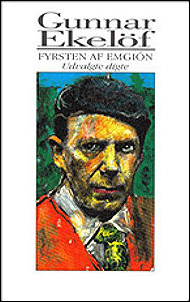
Gunnar Ekelöf (15 september 1907 – 16 maart 1968)
Cover
De Amerikaanse schrijver James Fenimore Cooper werd geboren in Burlington, New Jersey op 15 september 1789. Zie ook alle tags voor James Fenimore Cooper op dit blog.
Uit: The Last of the Mohicans
“A wide frontier had been laid naked by this unexpected disaster, and more substantial evils were preceded by a thousand fanciful and imaginary dangers. The alarmed colonists believed that the yells of the savages mingled with every fitful gust of wind that issued from the interminable forests of the west. The terrific character of their merciless enemies increased immeasurably the natural horrors of warfare. Numberless recent massacres were still vivid in their recollections; nor was there any ear in the provinces so deaf as not to have drunk in with avidity the narrative of some fearful tale of midnight murder, in which the natives of the forests were the principal and barbarous actors. As the credulous and excited traveler related the hazardous chances of the wilderness, the blood of the timid curdled with terror, and mothers cast anxious glances even at those children which slumbered within the security of the largest towns. In short, the magnifying influence of fear began to set at naught the calculations of reason, and to render those who should have remembered their manhood, the slaves of the basest passions. Even the most confident and the stoutest hearts began to think the issue of the contest was becoming doubtful; and that abject class was hourly increasing in numbers, who thought they foresaw all the possessions of the English crown in America subdued by their Christian foes, or laid waste by the inroads of their relentless allies.
When, therefore, intelligence was received at the fort which covered the southern termination of the portage between the Hudson and the lakes, that Montcalm had been seen moving up the Champlain, with an army “numerous as the leaves on the trees,” its truth was admitted with more of the craven reluctance of fear than with the stern joy that a warrior should feel, in finding an enemy within reach of his blow. The news had been brought, toward the decline of a day in midsummer, by an Indian runner, who also bore an urgent request from Munro, the commander of a work on the shore of the “holy lake,” for a speedy and powerful reinforcement. It has already been mentioned that the distance between these two posts was less than five leagues. The rude path, which originally formed their line of communication, had been widened for the passage of wagons; so that the distance which had been traveled by the son of the forest in two hours, might easily be effected by a detachment of troops, with their necessary baggage, between the rising and setting of a summer sun. The loyal servants of the British crown had given to one of these forest-fastnesses the name of William Henry, and to the other that of Fort Edward, calling each after a favorite prince of the reigning family.”

James Fenimore Cooper (15 september 1789 – 14 september 1851)
Cover luisterboek
De Jamaicaanse dichter en schrijver Festus Claudius “Claude “McKay werd geboren op 15 september 1890 in Sunny Ville, Clarendon, Jamaica. Xie ook alle tags voor Claude McKay op dit blog.
Russian Cathedral
Bow down my soul in worship very low
And in the holy silences be lost.
Bow down before the marble man of woe,
Bow down before the singing angel host.
What jewelled glory fills my spirit’s eye,
What golden grandeur moves the depths of me!
The soaring arches lift me up on high
Taking my breath with their rare symmetry.
Bow down my soul and let the wondrous light
Of beauty bathe thee from her lofty throne,
Bow down before the wonder of man’s might.
Bow down in worship, humble and alone;
Bow lowly down before the sacred sight
Of man’s divinity alive in stone.
Jasmines
Your scent is in the room.
Swiftly it overwhelms and conquers me!
Jasmines, night jasmines, perfect of perfume,
Heavy with dew before the dawn of day!
Your face was in the mirror. I could see
You smile and vanish suddenly away,
Leaving behind the vestige of a tear.
Sad suffering face, from parting grown so dear!
Night jasmines cannot bloom in this cold place;
Without the street is wet and weird with snow;
The cold nude trees are tossing to and fro;
Too stormy is the night for your fond face;
For your low voice too loud the wind’s mad roar.
But, oh, your scent is here–jasmines that grow
Luxuriant, clustered round your cottage door!
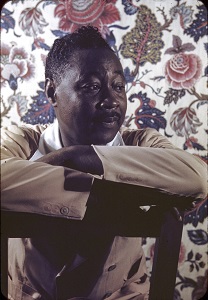
Claude McKay (15 september 1890 – 22 mei 1948)
Gefotografeerd door Carl Van Vechten in 1941
De Duitse schrijver, redacteur en essayist Karl Philipp Moritz werd geboren in Hamelin op 15 september 1756. Zie ook alle tags voor Karl Philipp Moritz op dit blog.
Uit:Reisen eines Deutschen in England im Jahre 1782
„Auf der Themse den 31sten Mai.
Endlich, liebster G…, befinde ich mich zwischen den glücklichen Ufern des Landes, das zu sehen, schon Jahre lang mein sehnlichster Wunsch war, und wohin ich mich so oft in Gedanken geträumt habe. Vor einigen Stunden dämmerten noch die grünen Hügel von England vor uns in blauer Ferne, jetzt entfalten sie sich von beiden Seiten, wie ein doppeltes Amphytheater.
Die Sonne bricht durch das Gewölk, und vergoldet wechselsweise mit ihrem Schein Gebüsche und Wiesen am entfernten Ufer. Zwei Masten ragen mit ihren Spitzen aus der Tiefe empor: fürchterliche Warnungszeichen! Wir segeln hart an der Sandbank vorbei, wo so viel Unglückliche ihr Grab fanden.
Immer enger ziehen sich die Ufer zusammen: die Gefahr der Reise ist vorbei, und der sorgenfreie Genuß hebt an. Wie ist doch dem Menschen nach der Ausbreitung die Einschränkung so lieb! Wie wohl und sicher ists dem Wandrer in der kleinen Herberge, dem Seefahrer in dem gewünschten Hafen! Und doch bleibt der Mensch immer im Engen, er mag noch so sehr im Weiten sein; selbst das ungeheure Meer zieht sich um ihn zusammen, als ob es ihn in seinen Busen einschließen wollte; um ihn ist beständig nur ein Stück aus dem Ganzen herausgeschnitten.
Aber das ist ein herrlicher Ausschnitt aus dem Ganzen der schönen Natur, den ich jetzt um mich her erblicke. Die Themse voll hin und her zerstreuter großer und kleiner Schiffe und Böte, die entweder mit uns fortsegeln oder vor Anker liegen; die Hügel an beiden Seiten mit einem so milden sanften Grün bekleidet, wie ich noch nirgends sahe. Die reizenden Ufer der Elbe, die ich verließ, werden von diesen Ufern übertroffen, wie der Herbst vom Frühlinge! Allenthalben seh ich nichts, als fruchtbares und bebautes Land, und die lebendigen Hecken, womit die grünen Weizenfelder eingezäunt sind, geben der ganzen weiten Flur das Ansehen eines großen majestätischen Gartens. Die netten Dörfer und Städtchen und prächtigen Landsitze dazwischen, gewähren einen Anblick von Wohlstand und Überfluß, der über alle Beschreibung ist.
Insbesondre schön ist die Aussicht nach Gravesand, einem artigen Städtchen; das einen der Hügel hinangebaut ist, und um welches Berg und Tal, Wiesen und Äcker mit untermischten Lustwäldchen und Landsitzen sich auf die angenehmste Art durchkreuzen. Auf einem der höchsten Hügel bei Gravesand steht eine Windmühle, die einen guten Gesichtspunkt gibt, weil man sie, nebst einem Teile der Gegend, noch weit hin auf den Krümmungen der Themse sieht. Aber wie denn kein Vergnügen leicht vollkommen ist, so sind wir bei Betrachtung aller dieser Schönheiten auf dem Verdeck noch einem sehr kalten und stürmischen Wetter ausgesetzt. Ein anhaltender Regenguß hat mich genötiget, in die Kajüte zu gehen, wo ich mir eine trübe Stunde dadurch aufheitre, daß ich Ihnen die Geschichte einer angenehmen beschreibe.“

Karl Philipp Moritz (15 september 1756 – 26 juni 1793)
Cover
De Amerikaanse schrijver Jim Curtiss werd geboren op 15 september 1969 in Beaver Falls, Pennsylvania. Zie ook alle tags voor Jim Curtiss op dit blog.
Uit:Change me
“Ten euros,” he said. I had thought double that, and right then I decided to buy two.
“Ok,” I said, “I’ll take two.” The guy gave me a big smile and took two of the stationary, plastic-bagged cows from the back row and handed them to me.
“Batteries included,” he said.
“What service,” I responded, and smiled. I took the 50 euros from my pocket and handed it over. His face sort of changed as I held out the money, and he fished around in his pockets before asking if I had something smaller. I didn’t. He looked around for a second and then suggested that I go into a bar — he pointed at one behind me — and ask for change. I turned around and looked. There was a side street that led off of the main shopping avenue, and maybe 50 feet down was a busy pub. The plastic garden furniture placed out in front was completely occupied and surrounded by napkins and other trash lying on the ground. I nodded and told him I’d be right back.
As I walked, I felt the weight of apprehension settle upon me — I wasn’t sure how to ask for change. I racked my brain for the phrase and found an approximation before walking into the bar. Everyone noticed me coming in. The whole pub quieted down to check out the stranger. At least 30 sets of eyes rested on me. But the most important set — the barman’s — came nowhere close to mine. He studiously avoided eye contact for a full minute before I spoke up, asking him in Spanish to change me. “Puede cambiar me?”
He didn’t lift his head from his task, but responded, “Into what?” The people around me laughed, but I didn’t understand the joke.
“Two 20s and a 10,” I said. He again said something I didn’t catch — more laughter. “I’m sorry,” I responded. “I don’t understand.”
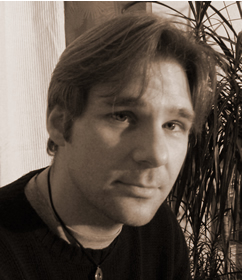
Jim Curtiss (Beaver Falls, 15 september 1969)
De Duitse schrijfster en dichteres Ina Seidel werd geboren op 15 september 1885 in Halle. Zie ook alle tags voor Ina Seidel op dit blog.
Sternenglaube
Seltsam wirkt der Sterne Walten
Über unsern dunklen Wegen,
Ihren schweigenden Gewalten
Mußt du still ans Herz dich legen.
Mußt getrost im Schatten wandern,
Wenn dein Glück sich stumm verschleiert
Und die Welt das Fest der andern
Unbekümmert weiter feiert.
Nach dem Takt der ew’gen Runde
Wandelt das Geschick im Tanze.
Unbewußt ist dir die Stunde:
Plötzlich liegt die Welt im Glanze.
Unsterblicher Lindenduft
Unsterblich duften die Linden
Was bangst du nur?
Du wirst vergehn,
und deiner Füße Spur
wird bald kein Auge mehr
im Staube finden.
Doch blau und leuchtend
wird der Sommer stehn
und wird mit seinem süßen Atemwehn
gelind die arme Menschenbrust entbinden.
Wo kommst du her?
Wie lang bist du noch hier?
Was liegt an dir?
Unsterblich duften die Linden
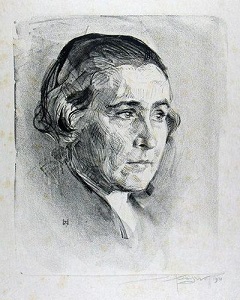
Ina Seidel (15 september 1885 – 2 oktober 1974)
Portret door Heinrich Wolff, 1931


